Ôn thi vào 10
Các câu hỏi tương tự
Mn ơi giúp e đề cuối đề này hơi khó ạ :3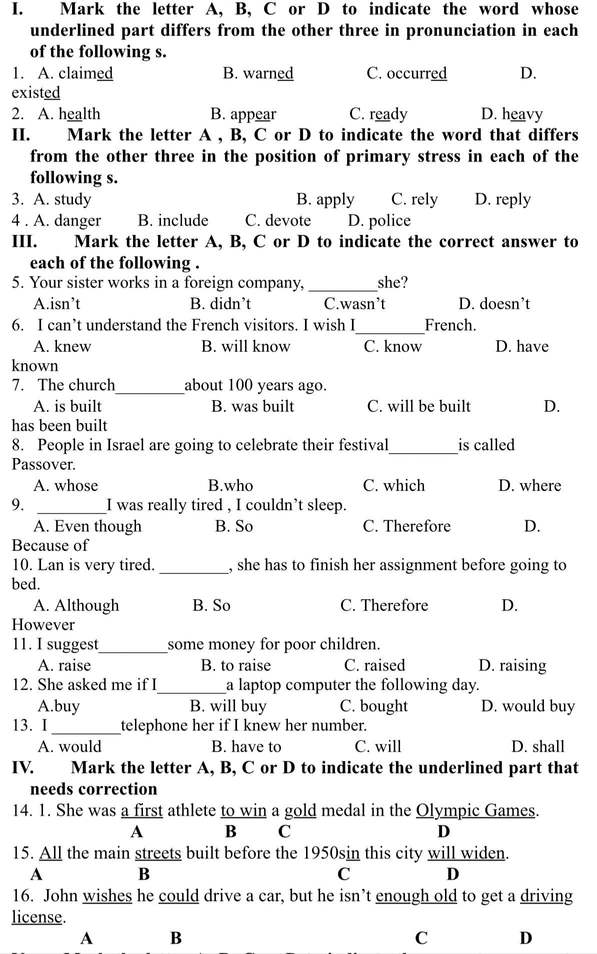

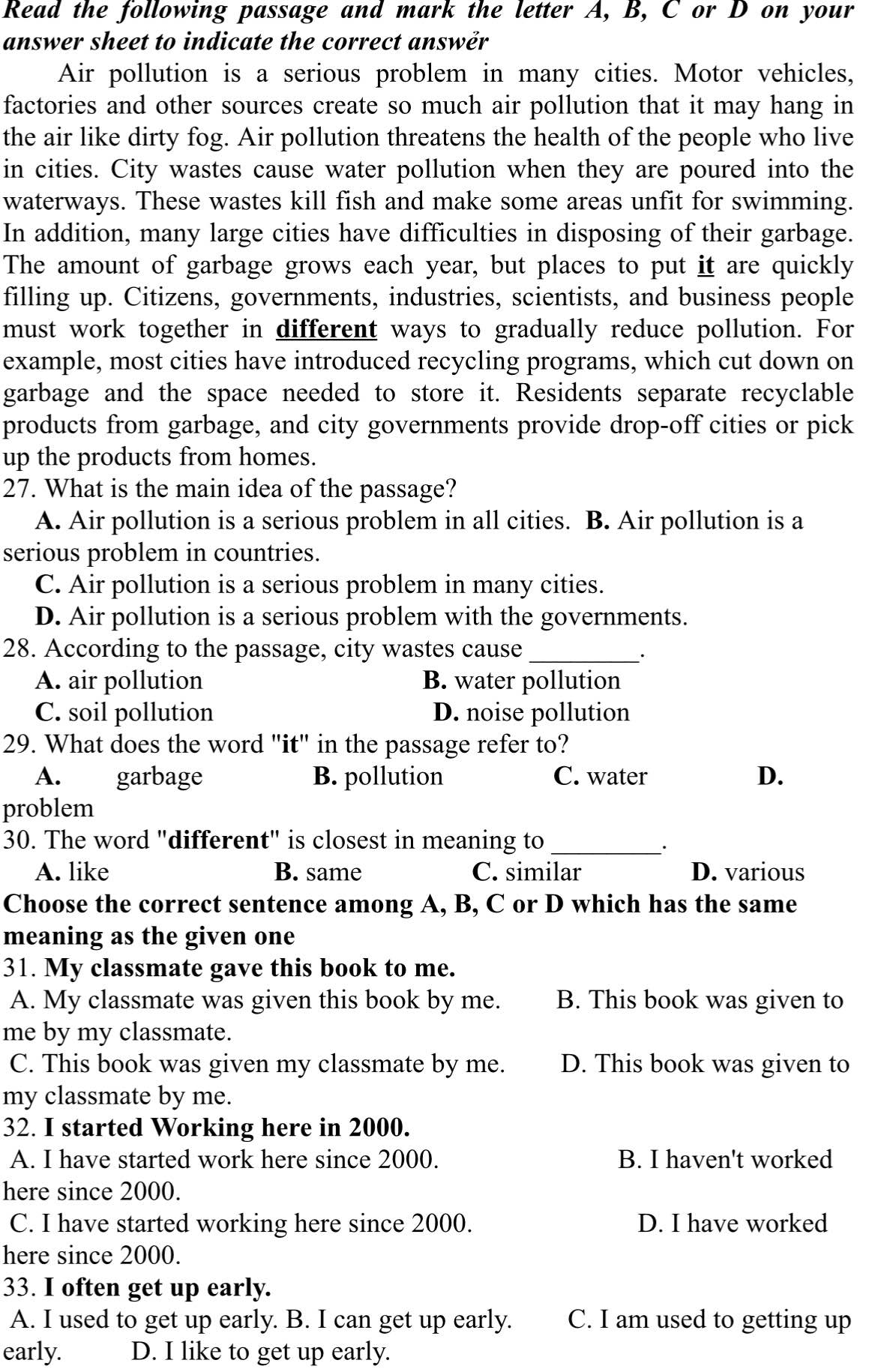
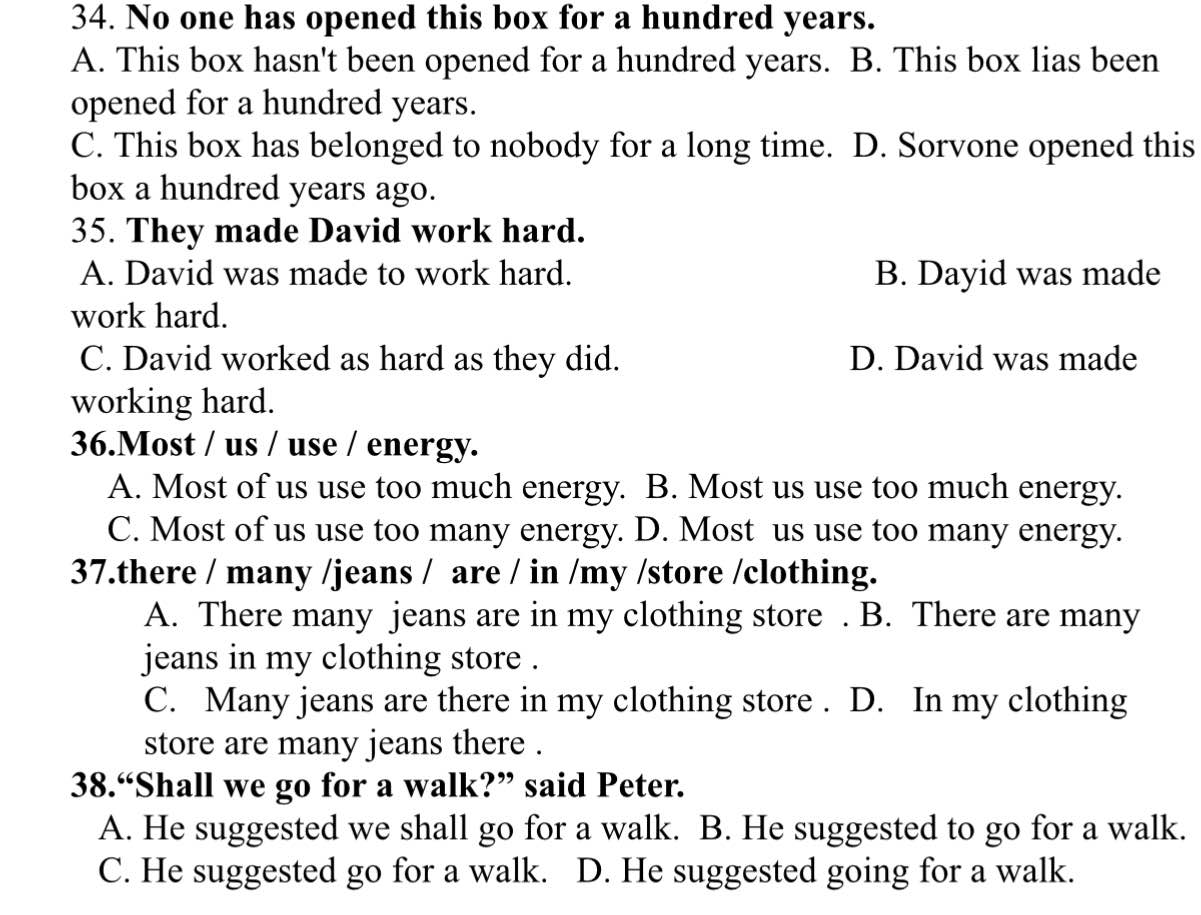
cho e hỏi
câu đk loại 2 ta dùng was hay were, nếu dùng was có sai không?\
trong cấu trúc đảo ngữ thì sao ạ, dùng was lên đầu sai ko ạ
vd nà:
if she was my friend, i would help her.
=> Was she my friend, I would help her ( câu này đúng hay sai ạ)
=> were she my friend, I would help her( e thấy đa phần người ta ghi vậy)
mn giúp e, e cm
MÌNH HỎI ĐỂ CHECK LẠI ĐÁP ÁN THUI Ạ, CÁC BẠN CHỈ CẦN TRẢ LỜI PHẦN A,B,D, MÌNH CẢM ƠN NHIỀUI. Chọn từ có phần gạch chân được phát âm khác so với các từ còn lại.1. A. town B. how C. grow D. cow2. A. wants B. says C. looks D. laughs3. A. machine B. washing C. brush D. chinII. Chọn...
Đọc tiếp
MÌNH HỎI ĐỂ CHECK LẠI ĐÁP ÁN THUI Ạ, CÁC BẠN CHỈ CẦN TRẢ LỜI PHẦN A,B,D, MÌNH CẢM ƠN NHIỀU
I. Chọn từ có phần gạch chân được phát âm khác so với các từ còn lại.
1. A. town B. how C. grow D. cow
2. A. wants B. says C. looks D. laughs
3. A. machine B. washing C. brush D. chin
II. Chọn từ có trọng âm chính rơi vào vị trí khác so với các từ còn lại.
4. A. prepare B. agree C. await D. borrow
5. A. destroy B. happen C. standard D. handsome
PHẦN B: NGỮ PHÁP VÀ TỪ VỰNG (4,0 điểm)
I. Cho dạng đúng của động từ trong ngoặc để hoàn thành các câu sau.
6. Mr. Dennis (go) __________ to New York in 1982.
7. She (not see) __________ her sister for three months.
8. She (ask) __________ me if I came from Vietnam.
9. Listen to these foreigners! What language they (speak) __________?
10. If I had worked harder at school, I (have) __________ a better job now.
II. Cho dạng đúng của từ trong ngoặc để hoàn thành các câu sau.
11. The accident happened because he drove __________. (CARE)
12. We often take part in many __________ activities at school. (CULTURE)
13. The Internet has helped students study more __________. (EFFECTIVE)
14. I bought an __________ book last Sunday. (INTEREST)
15. Traveling in big cities is becoming more __________ everyday. (TROUBLE)
III. Chọn một đáp án đúng trong số A, B, C hoặc D để hoàn thành mỗi câu sau.
16. The program was so ___________that half of them fell asleep.
A. boring B. bore C. bored D. boredom
17. Last night, I was watching TV ________my mother was cooking in the kitchen.
A.then B. and C. when D.while
18. The bridge ___________in 2000.
A.was built B. built C. has been built D. builds
19. If a disaster ____________in an area, people from the other areas will offer their help.
A. happen B. happened C. is happened D. happens
20. She likes watching the stars ________night.
A.at B.on C.for D.in
21. He’s never gone to school on Sunday, ___________?
A. has he B. is he C. hasn’t he D. isn’t he
22. Islam is the country’s official ______________in Malaysia.
A. region B. currency C. religion D. capital
23. She can’t go to the party because she will have to _____________her little sister.
A. look up B. look for C. look after D. look at
24. John: "Shall we go out to choose a birthday gift for Mary?" - Peter: " ___________________."
A. Good idea B. Happy Birthday C. Yes, please do D. Are you sure ?
25. We’ll meet David, _________________comes from England.
A. whom B. that C. which D. who
PHẦN C: ĐỌC HIỂU (3,0 điểm)
I. Chọn một từ thích hợp điền vào mỗi chỗ trống để hoàn thành đoạn văn sau.
Malaysia is one of the countries of the Association of South East Asian Nations (ASEAN). It is divided (26) ________ two regions, known as West Malaysia and East Malaysia. The (27) ________ of Malaysia is Kuala Lumpur. The population in 2001 was over 22 million. Islam is the country’s official (28) ________. In addition there are other religions such (29) ________ Buddhism and Hinduism. The national language is Bahasa Malaysia. English, Chinese, and Tamil (30) ________ also widely spoken. Bahasa Malaysia is the primary language of instruction in all secondary schools, although some students may continue learning in Chinese or Tamil.
II. Đọc đoạn văn sau và chọn một đáp án đúng trong số A , B, C hoặc D.
Alfred Bernhard Nobel, a Swedish inventor and philanthropist, bequeathed most of his vast fortune in trust as a fund from which annual prizes could be awarded to individuals and organizations that had achieved the greatest benefit to humanity in a particular year. Originally there were six classifications for outstanding contributions designated in Nobel’s will including chemistry, physics, physiology or medicine literature, and international peace. The prizes are administered by Nobel foundation in Stockholm. In 1969, a prize for economics endowed by the Central Bank of Sweden was added. Candidates for the prizes must be nominated in writing by a qualified authority in the field of competition. Recipients in physiology or medicine by the Caroline institute; in literature by the Swedish Academy; and in pace by the Norwegian Nobel committee appointed by Norway’s parliament. The prizes are usually presented in Stockholm on December 10, with the king of Sweden officiating, an appropriate tribute to Alfred Nobel on the anniversary of his death. Each one includes a gold medal, a diploma, and a cash award of about one million dollars.
31. What does the passage mainly discuss?
A. Alfred Bernhard Nobel B. The Nobel Prizes
C. Great contributions to mankind D. Swedish philanthropy
32. Why were the prizes named for Alfred Bernhard Noble?
A. He left money in his will to establish a fund for the prizes.
B. He won the first Noble prize for his work in philanthropy.
C. He is now living in Sweden.
D. He serves as chairman of the committee to choose the recipients of the prizes.
33. How often are the Nobel prizes awarded?
A. Five times a year B. Once a year C. Twice a year D. Once every two years
34. The word “outstanding” in line 4 could best be replaced by _______.
A. recent B. unusual C. established D. exceptional
35. The word “one” in line 13 refers to _______.
A. tribute B. anniversary C. prize D. candidate
III. Chọn một đáp án trong số A, B, C hoặc D điền vào mỗi chỗ trống để hoàn thành đoạn văn sau.
Mr. Brown and some volunteer conservationists are on a very dirty beach now. Today they are ready to make the beach a clean and beautiful place again. After listening to Mr. Browns instructions, they are divided into three groups. Group I needs to walk along the shore. Group 2 should check the sand, (36) _________ group 3 has to check among the rocks. Garbage must be put into plastic bags, and the bags will be (37) __________ by Mr. Jones. He will take the bags to the garbage (38) _________. Each member will be given a map to find the right place. They won’t eat the picnic lunch (39) __________ by Mrs. Smith until the whole area is clean. They all are eager to work hard so as to refresh this (40) ________ area.
36. A. or B. and C. because D. though
37. A. selected B. chosen C. collected D. elected
38. A. dump B. yard C. area D. place
39. A. happened B. provided C. achieved D. shown
40. A. spoiling B. spoil C. spoiled D. spoils
PHẦN D: VIẾT (2,0 điểm)
I. Viết lại các câu sau sao cho nghĩa không thay đổi so với câu ban đầu, bắt đầu bằng từ gợi ý.
41. I'm sorry. I can't help you now. à I wish _________________________________________________.
42. We started learning English four years ago. à We have _____________________________________.
43. "What kind of books do you like best, Linda?" asked Peter. à Peter asked ______________________.
44. They will build a new school next month. à A new school __________________________________.
45. It was only when I left home that I realized how much my father meant to me. à Not until _________.
II. Viết lại các câu sau sao cho nghĩa không thay đổi so với câu ban đầu, sử dụng từ cho sẵn trong ngoặc đơn (không được thay đổi dạng của từ trong ngoặc).
46. They started playing tennis in 2003. (SINCE)
47. Although he is very old, he can walk to the station. (AGE)
48. They have just produced a new kind of plants. (BEEN)
49. She doesn’t have time to revise the lesson. (WISHES)
50. This hotel is inaccessible in winter. (POSSIBLE)
They failed to find out a solution to the problem
--> They didn’t succeed in finding out a solution to the problem
mng ơi, cho mình hỏi sao khi viết lại câu mà sau didn't, từ succeed vẫn thêm ed vậy ạ?
Cho mình xin từ câu 11 trở đi đc ko ạ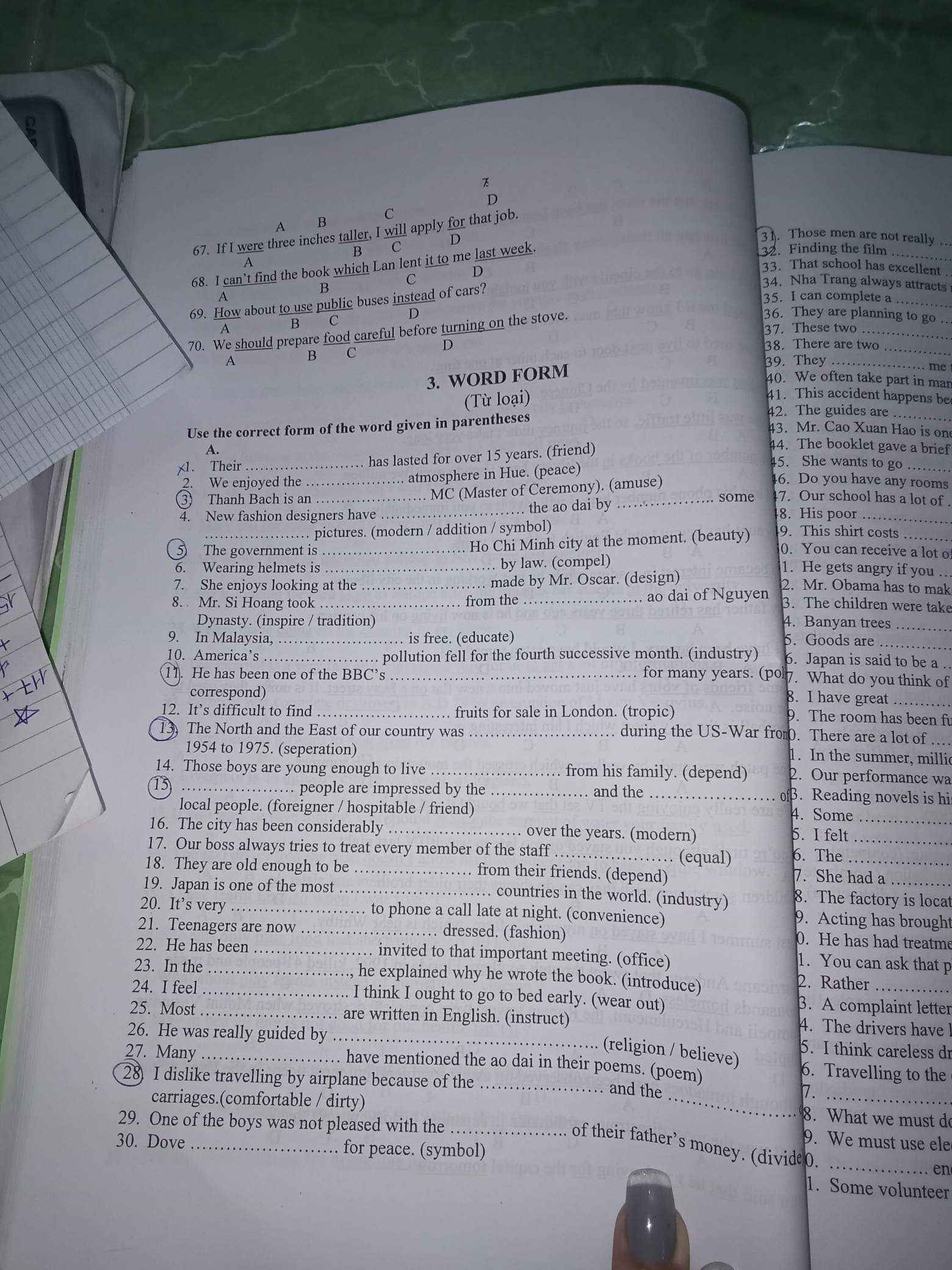
Mọi người giúp mình điền từ loại vào bảng với ạ, mình đang cần gấp ạ!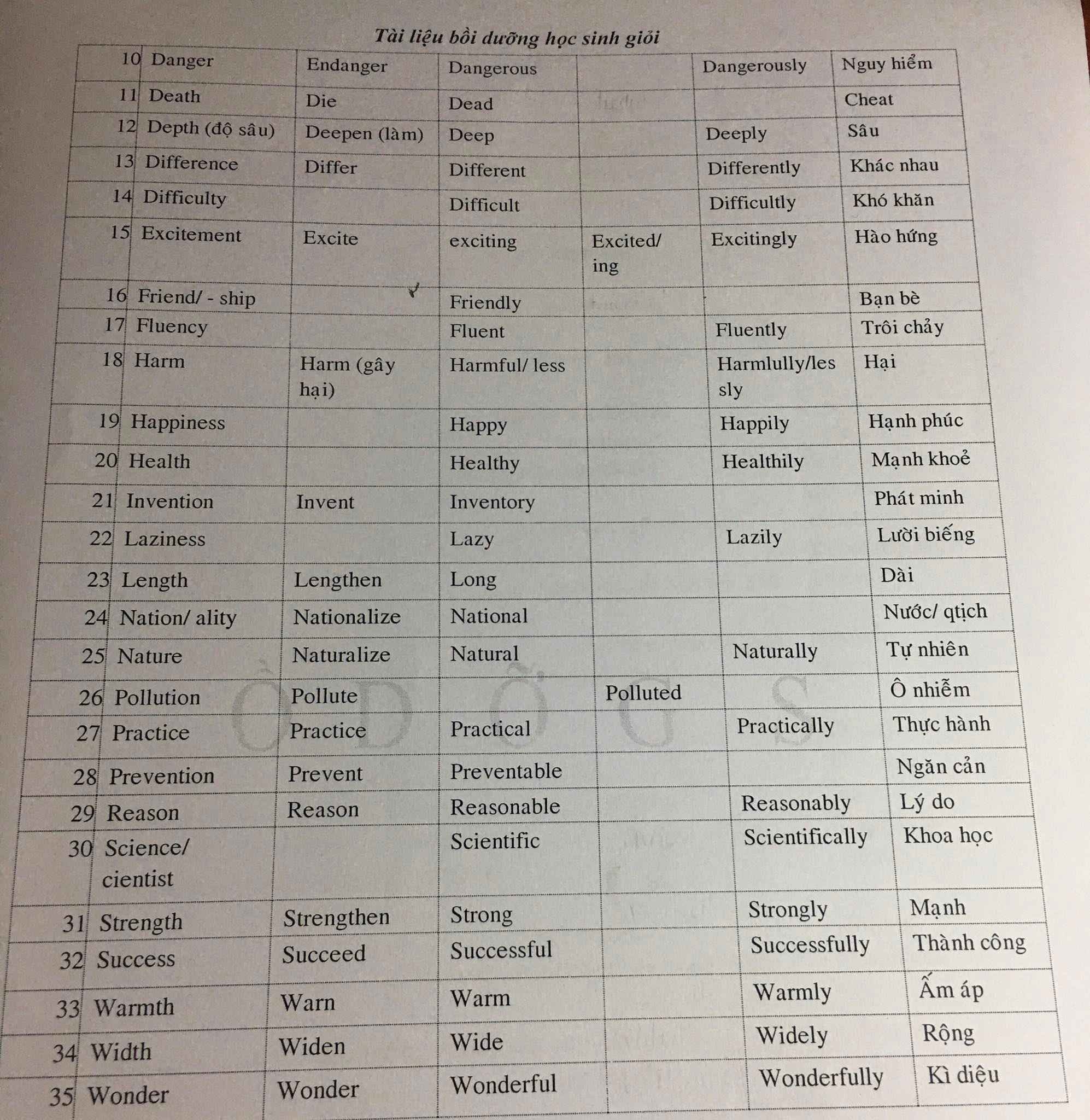
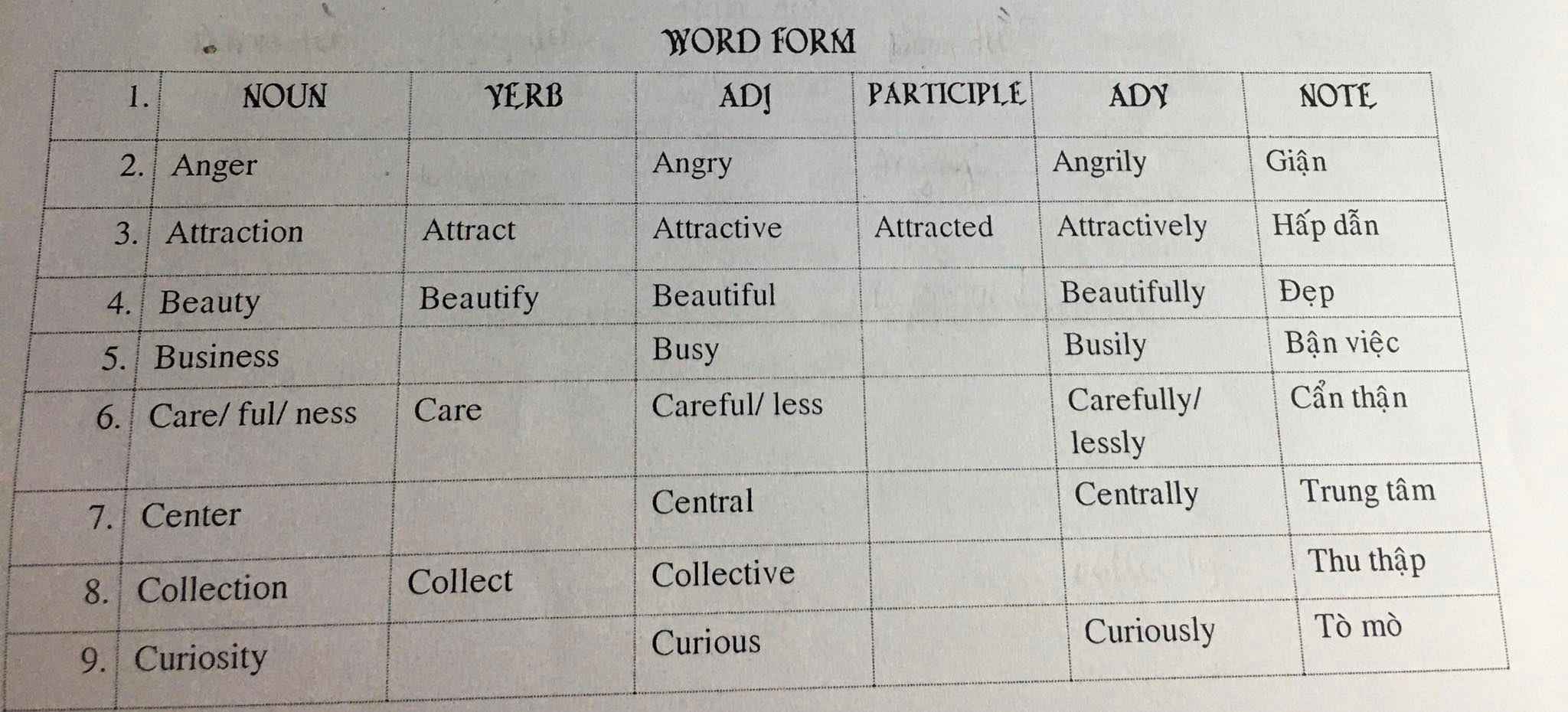
Mọi người giúp mình điền từ loại vào bảng với ạ, mình đang cần gấp ạ!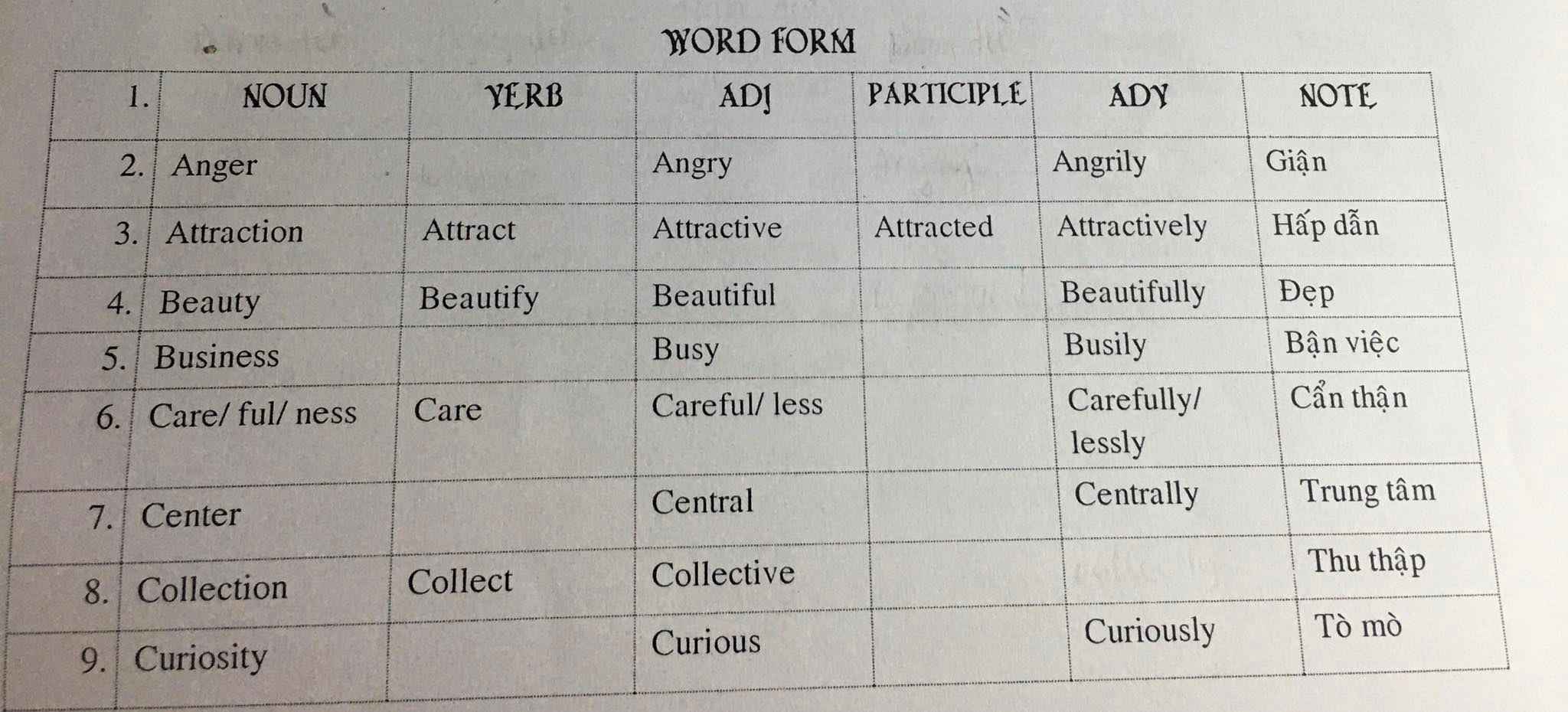
Mọi người giúp mình điền từ loại vào bảng với ạ, mình đang cần gấp ạ!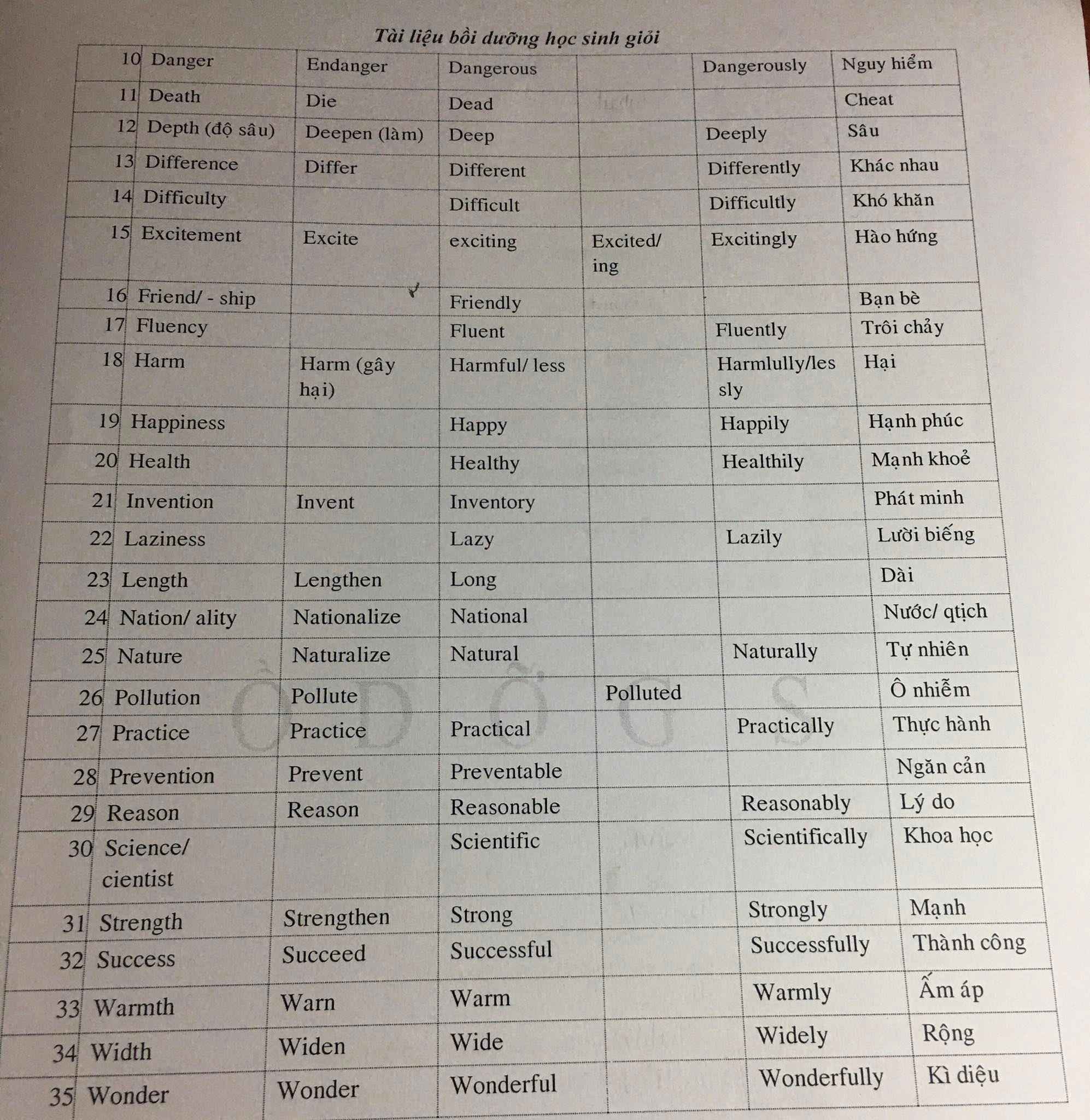
Cái này có nghĩa là như thế nào lấy ví dụ để mình biêt ạ Lưu ý: Không dùng thì này với các động từ chỉ nhận thức, tri giác như: be, understand (hiểu), know(biết), like(thích) , want(muốn) , see(nhìn), hear(nghe), glance(liếc qua), feel(cảm thấy), think(nghĩ), smell(ngửi), love(yêu). hate(ghét), realize(nhận ra), seem(dường như), remember(nhớ), forget(quên), etc











